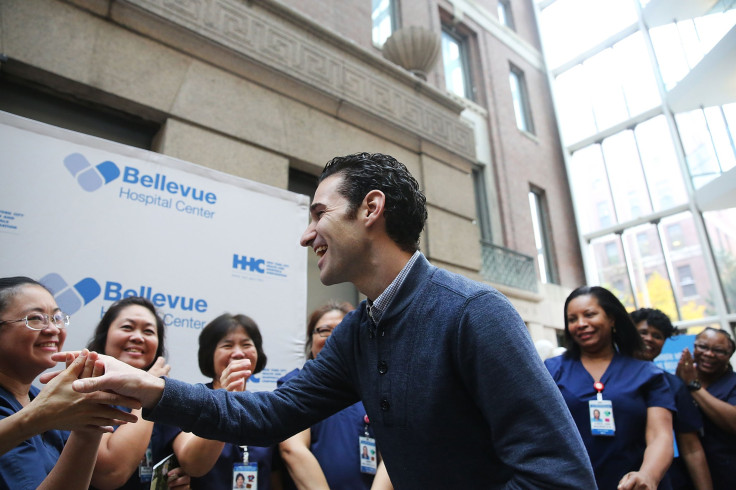Where Is Craig Spencer Now? Ebola NYC Patient Thanks Bellevue Doctors One Year After Diagnosis

Craig Spencer, the New York City doctor who contracted and survived the deadly Ebola virus last year, had a happy reunion this week with the doctors who cared for him. Spencer visited Bellevue Hospital Center Tuesday to thank the staff who treated him and spread word of his mission to help communities abroad wrecked by the illness, the Associated Press reported.
Officials diagnosed Spencer, a 34-year-old who works in emergency medicine at the New York-Presbyterian/Columbia University Medical Center, with Ebola on Oct. 23, 2014. He experienced symptoms after returning from a Doctors Without Borders trip to treat patients in Guinea, the West African country where the international outbreak is thought to have started. Spencer flew into the John F. Kennedy airport, walked the High Line, rode several subway trains and went bowling before being admitted to Bellevue's infectious diseases unit, ABC News reported. The hospital announced he was cured less than three weeks later.
The Wall Street Journal reported that over the past year, Spencer got married and traveled back to Guinea to volunteer more. He joked Tuesday that his moment in the spotlight had been brief. "I didn’t even get 15 minutes [of fame]," he told the Journal. "I got five."
Hugs&smiles at 1yr anniv reunion of Dr Craig Spencer & specialized #Ebola team who cared for him #BellevueProud pic.twitter.com/BjiayjRTU6
— HHC BellevueHospital (@BellevueHosp) October 20, 20151 yr later leadership from #HHC @Bellevuehosp talk with Dr. Craig Spencer, NYCs only #Ebola patient. #NYC pic.twitter.com/Px7rEW9cLQ
— NYC Health&Hospitals (@HHCnyc) October 20, 2015Dr Craig Spencer & Dr Laura Evans patient/doctor and forever friends reunite 1yr after Spencer's #Ebola treatment pic.twitter.com/VNlEGE9hue
— HHC BellevueHospital (@BellevueHosp) October 20, 2015Ebola cases have dramatically decreased in recent months. No cases were confirmed in the week ending Oct. 11, though about 150 high-risk people in Guinea were being monitored, according to the World Health Organization. Sierra Leone hasn't had any confirmed cases in about a month. Worldwide, the outbreak of the disease has reportedly killed more than 11,000 people.
Dr. Laura Evans, of Bellevue, told the Journal Tuesday that Spencer has stayed in touch with the hospital workers. Though his treatment may be over, the center can't let its guard down. "Our Department of Health and Mental Hygiene is still doing active monitoring on 300 to 400 persons a day in New York City who have traveled to regions where there is still Ebola," Evans said, adding the unit remained active.
© Copyright IBTimes 2025. All rights reserved.






















